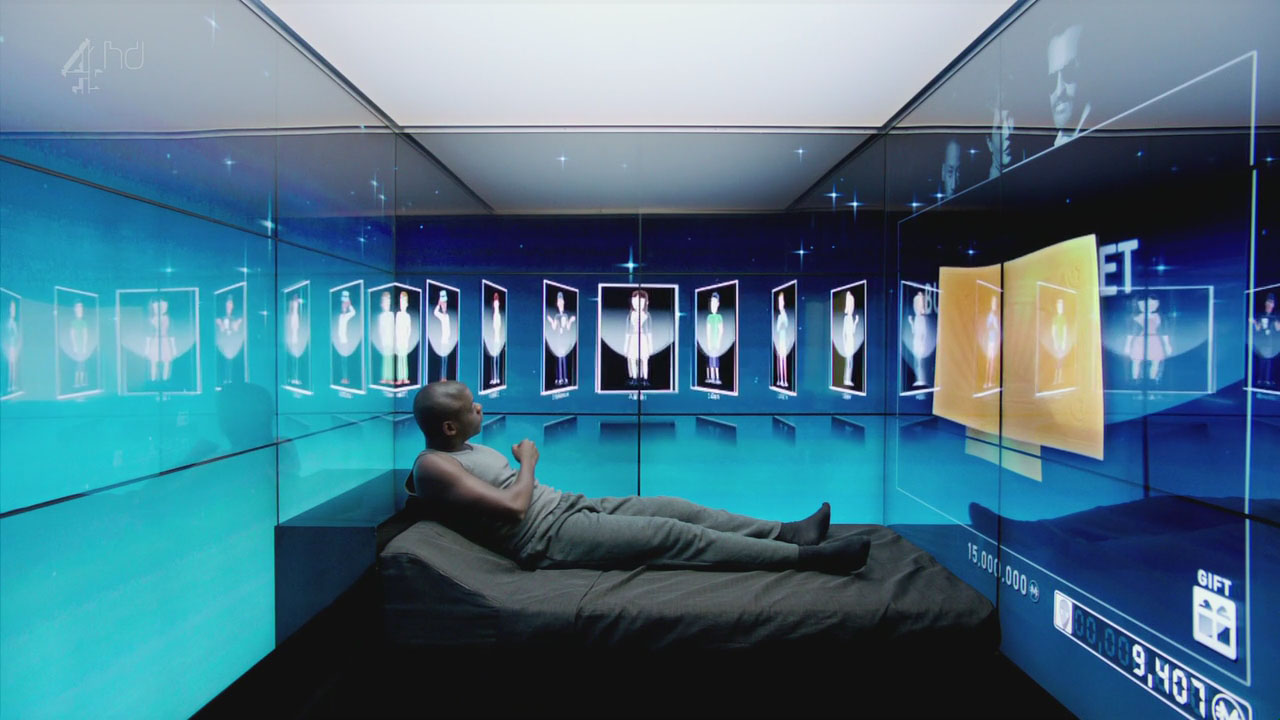According to Charlie Brooker, we are all doomed. With the inevitable sacrifice of our brain power to the machine and the increase of mind numbing reality television shows, the face of the human race as we know it is indelibly changed. Or so Brooker would have us believe. His argument is pretty persuasive too; television shows like Dead Set and Black Mirror have not only held up a less than favourable mirror to our mindless acts. They have convinced us that they are right.
Surely, though, Brooker’s brand of satire is merely another form of manipulation? If Brooker truly wanted to drive his point home, perhaps he would be better suited turning to a media completely opposed from the televisual technologies he has come to loathe so deeply? Perhaps not. It seems, by utilising the popular form which Brooker seems to believe is brainwashing the lot of us, he is able to reach a wider audience.
The future’s coming quickly and, in Brooker’s eyes at least, it is not rosy. Black Mirror posits a present and future which are overwhelmingly bleak. We have become subsumed by technology and reliant on its time saving techniques. We view the world through the eyes of a machine, puppets to its digital controls. In the final episode of Black Mirror’s first season, a couple are ripped apart by their mutual reliance on technology. A chip inserted into the side of your head allows you to rewind and pause your memories. It effectively is a third eye, filming every experience and allowing its user to live and relive their past. In one particularly grim scene, the couple lie in each other’s arms, eyes glazed over by the replay of past moments. Their bodies are in one place but their minds are absent. Inevitably, they are drawn into the pettiness of being able to rewind and relive exactly what the other has said and done, obsessed over the minutiae that they would normally forget.
Black Mirror is a warning of sorts. If we continue to become as subsumed by technology as we currently are, then things could start to go downhill. And fast. Black Mirror looks at our obsession with reality television and game shows, turning a trial into a televised action event, a relationship into a twisted robotic monstrosity and a political campaign into mind washing propaganda. Current British television shows like Bad Robots don’t exactly fight the corner of technology, either. Set up in a Punk’d-esque format, the show centres around ‘machines gone wrong’ altering the technology we use in everyday life to play nasty tricks on us. So far, so whatever. The real issue lies in the responses of the humans involved, who obey without question the increasingly ridiculous demands the machines bark at them. It’s the televisual equivalent of the satnav which told lead its driver over a cliff. Urban legend or not, this ‘story’ nonetheless marks our reliance and willing submission to the machines that we have created to make our lives easier.
We are stuck in the middle of a moment of change. Whilst technology has enjoyed an unparalleled advance over the course of the last ten years, for many of us, we are at a stage in which we would like it to stop. Demanding this of a part of life whose very core is devoted to constant advancement seems a little contradictory. What’s more, we are the very reason behind technology’s sudden acceleration, buying into each new technology that we are given. Sales of technology have increased so rapidly over the last ten years that it is difficult to consider how we will move any faster. Whilst the original IPod took around one year to reach 1 million sales, the IPhone 6 reached the same number within 4 hours. And things only continue to move on. With Google currently investing in a home delivery drone service, it seems that technology is spiralling somewhat out of control.
But are things really as bad as they seem? We constantly seem to be living in the most extreme moment in time, told time and again how our international population is the most violent, the most suffering, the most corrupted. It seems, however, that our fears may be somewhat groundless. Whilst things are undeniably not perfect, the global climate in which we live is constantly thriving to better itself, actively encouraging social change and progression. Technology is firmly rooted in this change.
The conception of the computer generation, arguably rooted in the mind of Alan Turning, is responsible for the way in which society has moved over the last 50 years or so. We now live in a time in which the next generation will never have experienced a life without the presence of computer technology; there is no going back. Nor should we want to. The internet allows us to reach audiences previously unimaginable; it allows us to learn anything that we should so wish. Sharing information at a faster speed is beneficial in so many ways and undeniably contributes to our attempts to better global society.
Of course, as in everything, there are many naysayers to the technological cause. Satirists like Charlie Brooker are responsible for a great degree of fear mongering among the technology-aware population. And, realistically speaking, there is an element of truth to their fears. When we see people so completely absorbed by their worlds on tiny screens, it is hard to shout the benefits of a technological age. The trick is balance. With everything, there will be a degree of negative change. But if, even in only a small percentage, the change will be beneficial to some section of society, it is unquestionably positive. As represented in Wally Pfister’s recent box office flop Transcendence, our technological fear will eventually prevent us from going further than we have ever been before. The scary part is making the leap into the future. Although we are the masters of our own technology, pretty soon it will start to have a life of its own. And when that happens, all bets are off.

